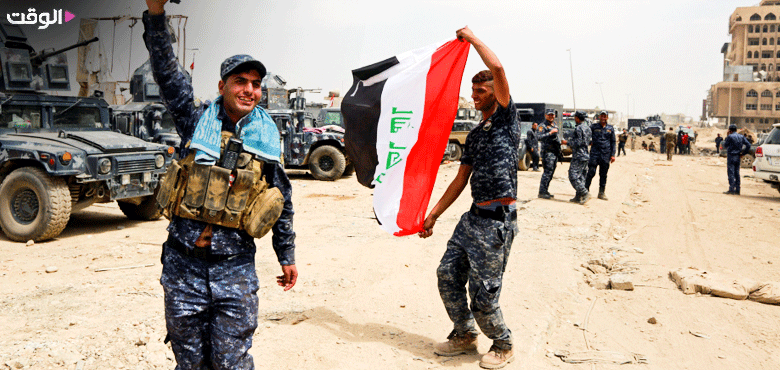Alwaght- After a several-month pause to its attacks in Iraq, ISIS once again made news headlines in the Arab country. Tuesday night, the terrorist group in an ambush attacked people from Al-Hawashah village near the town of Muqdadya in Diyala province, killing 13 and injuring more. A few others later another attack was launched in Al-Imam town in northern Baqubah, another town in Diyala, leaving 7 dead. The series of attacks pushed Prime Minister Mustafa al-Kadhimi to send a security delegation including National Security Adviser Qasem al-Araji, army chief, the chief of the Joint Operations Command, and Fatah Coalition’s head Hadi al-Amiri to assess the situation. He vowed to take revenge and “chase the terrorists inside and outside Iraq.”
Conspiracy for sectarian war
The recent attacks evoke the memory of the attacks that Al-Qaeda and ISIS forerunners carried out in 2003 and following fall of Saddam Hussein. The attacks were seen as intending to spark sectarian war in Diyala and other parts of Iraq.
At the height of the home Iraqi war 15 years ago, such attacks mainly triggered retaliatory responses and sectarian and tribal clashes in some parts of the country.
A security source said that the victims of the terrorist attack were civilians from the Shiite tribe of Bani Tamim, adding that the attack took place at dawn on Wednesday in a village on the outskirts of Muqdadya. The source told local media that ISIS had already abducted three civilians from the Al-Rashad area and demanded ransom for their release. Then, while the families of the abductees were trying to free their children in exchange for ransom, ISIS elements opened fire. This frightened the people who rushed to the scene and were ambushed by the heavy gunfire. The outcome was 30 dead and injured.
According to information obtained by Al-Sharq Al-Awsat newspaper from a political source, many citizens were killed by gunfire, but nine of the victims were "stabbed to death" by terrorist elements. "Compared to all the previous operations that this terrorist organization carried out in the regions of this province, this operation was the most violent, the most brutal," the newspaper cited the source as saying.
Moeen al-Jubouri, a security expert, told Al-Hurra website "ISIS is taking advantage of the population diversity in these areas to launch its operations," noting that "the area where the incident took place is very sensitive, because the villages are mostly Shiite and Sunni.” On the other hand, the governor of Diyala said that the area where the attack took place is "mixed, sensitive, and has old problems," adding:" If the area moves back to the past, [precluding the crisis] will be difficult."
Some sources, meanwhile, said that there was risk of Shiite tribes’ revenge against Sunni tribes in northeastern Baqubah.
In order to thwart the mean ISIS plots, the crisis must be contained so that it does not turn into retaliatory measures and does not take on a sectarian aspect. A sectarian war is what ISIS is investing on. But reports suggest that there are efforts by leaders of Bani Tamin sect to foil the plot.
PMF and Iraq’s security needs
After rise of ISIS in 2014, the most important force involved in anti-terror battle has been Popular Mobilization Forces (PMF), influentially paving the way for fall of the self-proclaimed ISIS caliphate and helping the country liberate Mosul and other parts from the grasp of terrorist militants. After ISIS was obliterated in 2017, the voluntary force remained at the top of a front watching movements of ISIS remnants and sleeper cells.
The areas where the recent attacks took place were not attended by PMF, also called Hashed al-Sha’abi, and their security was in the hands of the army, police, and counter-terrorism forces. Some security gaps have been reported in advance.
"Security forces are always far from the villages and remote areas," Dr. Moataz Mohiuddin, a security and strategic expert and head of a think tank, told Al-Sharq Al-Awsat, adding: “This is what ISIS takes advantage of for its terrorist operations.”
Al-Sharq Al-Awsat, citing him, reported that there is another problem which is that the security services limit their work to collecting intelligence about militants from neighboring areas like Mokhawal and Hamrin mountains, plus the “triangle of danger” that covers south of Hawija in Kirkuk to Thareth in Salaheddin, and Al-Anbar. Additionally, the security forces usually camp for a short time in these areas and then move back to their bases.
In addition to security challenges, tribal links prevent terrorist information leaks to the security forces because ISIS recruits from the children of the trial leaders.
With PMF role in thwarting the re-emergence of ISIS in Iraq and Syria obvious to all, its deployment can both help quell terrorist moves and prevent a sectarian war. Immediately after the attacks, PMF in a statement declared readiness to fill the security vacuum in the targeted regions and elsewhere.



























